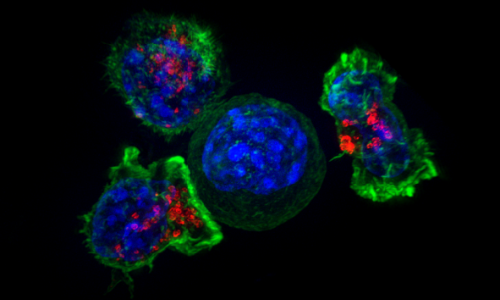Loading
Journal of Cancer Immunology
ISSN: 2689-968X
Most Read Articles
Chimeric Antigen Receptor CAR NK Cells Emerging Immunotherapy for the Treatment of Cancer
Sachin Kumar Deshmukh
Although NK cells are recognized as effector lymphocytes of the innate immune system, they also regulate the adaptive immune response by releasing inflammatory cytokines and developing immunological memory. Unlike other lymphocytes such as T or B cells, NK cells do not express rearrangeable, antigen-specific receptors.
J Cancer Immunol, 2019, Volume 1, Issue 1 | DOI: 10.33696/cancerimmunol.1.002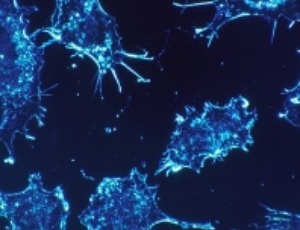
Leucocyte-Tumor Cell Hybridization Can Initiate Cancer Metastasis
John M. Pawelek , Zachary Grasmick , Eric Duvall , Greggory S. LaBerge
According to estimates from the International Agency for Research on Cancer, by the year 2030 there will be 22 million new cancer cases and 13 million deaths per year. The main reason for death from cancer is not the initial tumor but it’s metastasis to distant parts of the body, yet this process has remained poorly understood for quite some time.
J Cancer Immunol, 2020, Volume 2, Issue 1, p1-9 | DOI: 10.33696/cancerimmunol.2.006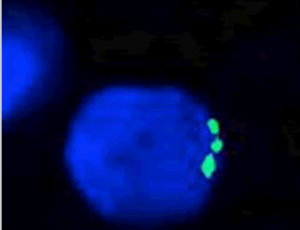
CTLA-4 and PD-L1 or PD-1 Pathways: Immune Checkpoint Inhibitors and Cancer Immunotherapy
Sachin Kumar Deshmukh
The immune system developed certain checks and balance to control or inhibit the reactivity against normal cells of the body. Uncontrolled immune responses to the non-self entities such as bacteria, viruses, parasites, or mutated self-antigens can cause an inflammatory reaction and autoimmune diseases.
J Cancer Immunol, 2020, Volume 2, Issue 1, p10-12 | DOI: 10.33696/cancerimmunol.2.007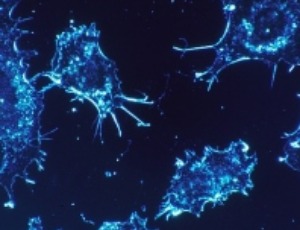
Small-molecule Interferon Inducers for Cancer Immunotherapy Targeting Non-T cell-inflamed Tumors
Eunha Kim , Sanghee Lee
Since the discovery of escaping mechanism of tumor from negative immune regulation, the paradigm of drug discovery for anti-cancer agents has been dramatically shifted to cancer immunotherapy (e.g., dendritic cell therapy, CAR-T cell therapy, or antibody therapy) by stimulating patient’s immune system to treat cancer.
J Cancer Immunol, 2021, Volume 3, Issue 1, p13-17 | DOI: 10.33696/cancerimmunol.3.037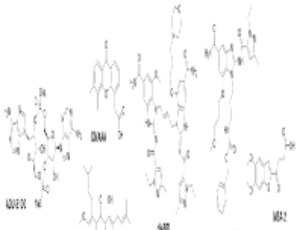
SHP2 Inhibition as a Promising Anti-cancer Therapy: Function in Tumor Cell Signaling and Immune Modulation
Jiawan Wang , Lindy Zhang , Christine A. Pratilas , Nicolas J. Llosa
The protein tyrosine phosphatase SHP2, encoded by PTPN11, functions as a critical signal transduction regulator and interacts with key signaling molecules in both RAS/ERK and PD-1/PD-L1/ BTLA (B- and T-lymphocyte attenuator) pathways. Targeting SHP2 pharmacologically, therefore, may be a promising therapeutic strategy for many RAS-driven cancers.
J Cancer Immunol, 2021, Volume 3, Issue 1, p18-29 | DOI: 10.33696/cancerimmunol.3.038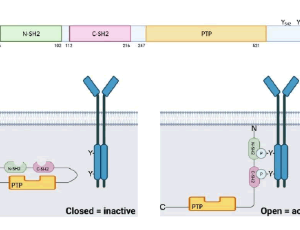
Salivary Protein Antigens for Breast Cancer Biomarkers
Imad Abrao Nemeir , Joseph Saab , Walid Hleihel , Abdelhamid Errachid , Nadia Zine
Breast Cancer is the most regularly diagnosed type of cancer in women in the world, making up on its own 25% of all cases, or nearly 2 million new cases in 2018, and 15% of all cancer related deaths, or around 626,700 deaths for that same year.
J Cancer Immunol, 2019, Volume 1, Issue 1, p24-30 | DOI: 10.33696/cancerimmunol.1.004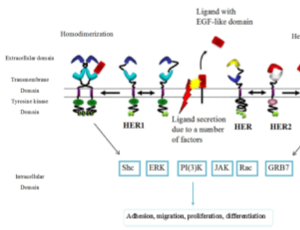
Expanding the Cancer Neoantigen Peptide Repertoire beyond In silico Tools
Amit Jain , Jackwee Lim
CD8+ cytotoxic T cells recognise and kill cancer cells that present immunogenic peptides bound to the cell surface major histocompatibility complex class I (MHC-I) molecules.
J Cancer Immunol, 2021, Volume 3, Issue 1, p30-36 | DOI: 10.33696/cancerimmunol.3.039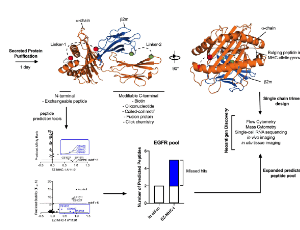
Inference of Clonal Copy Number Alterations from RNASequencing Data
Akdes Serin Harmanci , Arif O. Harmanci , Xiaobo Zhou
Tissues are composed of various types of interacting cells [1]. To understand the cellular organization and function in tissues, it is necessary to identify all of the different cell types and the locations of these different cell types within tissue structures. The transformative advances in experimental and computational methods will help us to build the complex map of the tissues and study how tissue organization influences the cell’s molecular state and interactions in healthy and diseased tissue.
J Cancer Immunol, 2020, Volume 2, Issue 3, p66-68 | DOI: 10.33696/cancerimmunol.2.018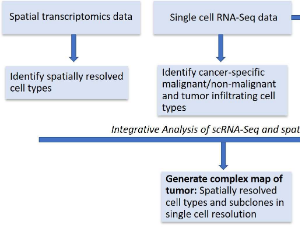
Mitochondria Autoimmunity and MNRR1 in Breast Carcinogenesis: A Review
Félix Fernández Madrid , Lawrence I. Grossman , Siddhesh Aras
We review here the evidence for participation of mitochondrial autoimmunity in BC inception and progression and propose a new paradigm that may challenge the prevailing thinking in oncogenesis by suggesting that mitochondrial autoimmunity is a major contributor to breast carcinogenesis and probably to the inception and progression of other solid tumors. It has been shown that MNRR1 mediated mitochondrial-nuclear function promotes BC cell growth and migration and the development of metastasis and constitutes a proof of concept supporting the participation of mitochondrial autoimmunity in breast carcinogenesis.
J Cancer Immunol, 2020, Volume 2, Issue 4, p138-158 | DOI: 10.33696/cancerimmunol.2.027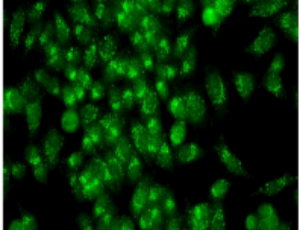
Emerging Strategies to Attack Polyploid Cancer Cells
Jing Zhang , Shenqiu Zhang , Qiong Shi , Dun Yang , Thaddeus D. Allen
Polyploid cancer cells can arise de novo in tumors or they can be induced by therapeutics that inadvertently increase the rate of cytokinetic failure. These cells portend a poor outcome in many cancers because polyploid cancer cells can undergo error prone reductive cell divisions to yield aneuploid progeny. The immune system has evolved mechanisms by which it can specifically recognize and remove polyploid cancer cells, but these appear to be tampered with malignancy so that polyploid cells can persist and fuel the development of cancer cell clones that are resistant to therapeutics and have metastatic potential.
J Cancer Immunol, 2020, Volume 2, Issue 4, p199-206 | DOI: 10.33696/cancerimmunol.2.031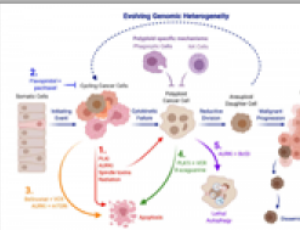
About Scientific Archives
Scientific Archives is a global publisher initiated with the mission of ensuring equal opportunity for accessing science to research community all over the world. Spreading research findings with great relevance to all channels without any barrier is our goal. We want to overcome the challenges of Open Access with ensured quality and transparency.

